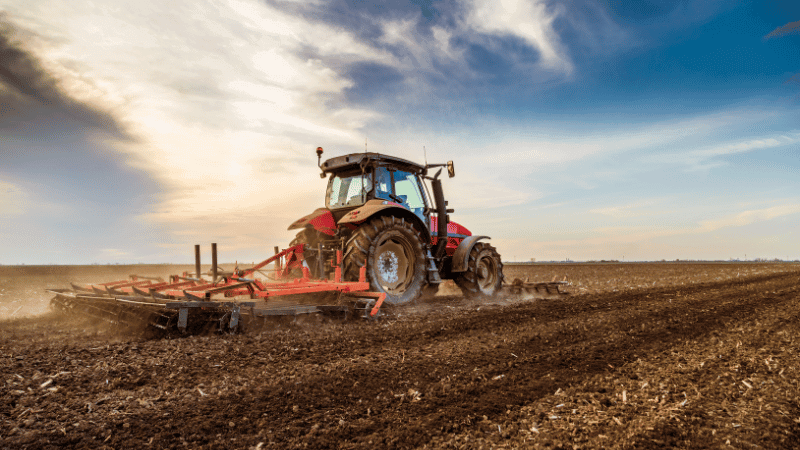Categories
A Guide to Tractor Finance

For most farms, tractors are an essential part of daily life. Tractor finance is borne from the need to use specialist agricultural machinery like this, even when access to capital is low.
Getting quality agricultural machinery is important to keep your farm or agricultural business running. But tractors and other farming equipment are expensive. Buying it outright may be beyond your budget.
Tractor finance and agricultural finance are specialist business finance methods that enable you to get the equipment you need without having to find the capital to fund an outright purchase.
What is Tractor Finance?
Tractor finance is a branch of asset finance, an established range of options for purchasing or leasing vehicles and equipment. In terms of working, tractor finance is similar to car leasing options.
There are two key types of asset finance commonly used in the agricultural industry:
- Finance leasing
- Operational leasing
Both can enable you to get a new tractor or other farming equipment without difficulty.
However, the specific way they work, how much they will cost, and, ultimately, what happens to the equipment at the end of the term is somewhat different.

Finance Lease vs. Operating Lease for Tractors
The core difference between a finance and an operating lease is that with a finance lease, responsibility for the maintenance of the tractor is with you, and eventual ownership is possible. With an operating lease, responsibility for the maintenance of the tractor is with the leasing company, who will always own it.
In essence, a finance lease is more like buying a tractor, whereas an operating lease is more like renting one.
Skip to:
Alternatives to Tractor Leasing
In Detail: Finance Leasing for Tractors
Finance leasing is an option for leasing a tractor where the upkeep and maintenance of the tractor is your responsibility as the lessee. Plus, there's an option to purchase the tractor outright at the end of the leasing contract.
Behind the Scenes
With a finance lease, the leasing company buys the tractor for you, and you repay the lender the full value in instalments plus an additional sum.
In terms of finance leasing, the lender won’t ever expect to own the tractor, and in most cases, no one will have used it before you. There may be some exceptions to this, but overall, the principle remains the same.
It is, in terms of usage, your tractor.
Of course, on paper, it’s a bit more complicated. Technically, the leasing company owns the tractor until you make a final payment to buy it. However, as the responsibility for maintaining the tractor is yours, it feels a lot like owning a tractor.
Flexibility of Use
A finance lease puts the onus on you to look after the tractor. The flip side of this is that you can use it without worrying. If you crunch a panel, it’s your responsibility to fix it. If you decide to paint it with red stripes, it’s up to you. With a finance lease, the fact that you must maintain the upkeep of the vehicle means you can use it how you want to without worrying too much about what happens.
BUT
It isn’t yours, so there may be limitations in use. One limitation may be that you can’t take the tractor out of the country. In most situations, this won’t be relevant as you are unlikely to want to go on holiday to Spain by tractor, but it will affect some borrowers.
The limitations of your lease may be negotiable, so discuss them with your leasing company to make sure you can use the equipment in the way you need to.
A Non-Cancellable Contract
The leasing company have gone out on a limb for you, paying for this tractor so that you can lease it from them and are trusting you to look after it. Consequently, the finance lease is defined as a non-cancellable contract.
This means you can’t won't be able to decide you don't want it anymore mid-way through the loan term. You will be liable for payments as stated in the contract.
That being said, you will have the opportunity to discuss and negotiate your contract with your leasing company if you enter financial hardship. However, you should still take the lease seriously.
Insurance and Maintenance
With a finance lease, all insurance becomes your responsibility, and full coverage will be obligatory. Similarly, the upkeep and general maintenance of the tractor is on you, and you will be expected to keep the vehicle in good condition.
This can be a considerable additional cost through the length of the lease and should definitely be factored into your calculations before working out how much the tractor finance lease will cost your business each month.
Any damage to the tractor will be owed in terms of fees at the end of the lease, so it’s in your best interest to keep the equipment in good condition.
Tax and Lease Payments
A finance leased asset will be recognised on the balance sheet as well as the lease liability.
This means that the depreciation of the tractor is allowable for tax purposes. The monthly finance payments are tax-deductible, and the attached VAT can be reclaimed.
It is worth discussing the tax implications of your lease agreement with your accountant in detail to make sure you are maximising your allowances and not missing out on any of the potential benefits.
End Ownership of the Tractor
As stated earlier in the blog, it's possible for you to own the tractor at the end of your lease. Under finance leasing, three options may be available:
Renew the Lease
Often, the most suitable option if you want to continue to use the tractor as you have been is to renew the lease and continue for another term. It is worth negotiating with your lease renewal as often payments will become smaller.
Buy the Tractor
One final “balloon” payment will allow you to buy the tractor outright at this point. As the tractor will have depreciated over time (which you have already paid for with the monthly lease payments), the cost of doing this will be considerably lower than buying a new tractor.
Finish the Lease
Alternatively, you can return the tractor and end the lease. Depending on the terms of your tractor finance and assuming it is in good condition, this may be as simple as just handing back the tractor. However, in some cases, it will be more complex.
When you finish the lease, the leasing company will want to sell the tractor to make the same money they would have done if you’d bought the tractor with a final balloon payment.
If you return the tractor in poor condition, you can expect to be charged fees that amount to the difference between its sale value and the expected value at this time. But if the tractor sells for more than anticipated, you may be entitled to a partial refund of your payments.
When the lease is finished, you can start a new lease with a brand-new tractor if you want to.

In Detail: Agriculture Operating Lease
An operating lease is more akin to a rental agreement. You never own the tractor and will return it at the end of the lease. You are not responsible for its maintenance or often even its insurance.
Behind the Scenes
The leasing company owns a shiny new tractor, which they rent to you for monthly payments. They’ll look after it in almost every way, retaining ownership throughout, and take it back when you are done with it.
Where a finance lease acts as if the tractor is yours in most ways, an operating lease clearly maintains that the equipment is the property of the leasing company.
Peace of Mind (Perhaps)
Perhaps the primary benefit of an operating lease is just how stress-free it can be for some borrowers. If there are any problems, you can contact the leasing company, and they’ll take care of it. Other than fuel, much of the heavy work is done by them. It can be a very relaxing arrangement.
Conversely, there is the worry that you might damage someone else’s equipment and that can lead to you feeling limited in its usage. This can be especially constricting with a tractor, which, by its nature, will be put into many testing situations.
A lot depends on your personality and perspective: some see external ownership as an advantage, while others see it as a hindrance.

Insurance and Maintenance
As explained, all maintenance and servicing of the tractor will be done by the leasing company, and you won’t have to worry about it. In many cases, they will also take responsibility for factors like insuring the tractor.
However, it is worth checking your contract thoroughly before assuming these things, as each leasing company may have their own variations on any standard terms. Some will expect you to insure the vehicle yourself, while others may expect you to pay for some items, such as tyre wear and tear.
Any damage done to the tractor will incur a fee, and you’ll be expected to keep it in excellent condition. Additionally, claims for damages on the tractor’s insurance will often come with an excess cost to you.
Tax and Lease Payments
Tax with operating leases can be complicated, and it is worth discussing the pros and cons with your accountant. Previously, assets under operating leases were not part of the balance sheet.
However, changes to legislation in recent years make this less clear, with differences based on the length of the lease. For all leases under 12 months, operating leases work as they did previously, except payments are considered operating expenses and not loan repayments.
Because operating lease payments include servicing, maintenance, and often insurance, the true monthly cost of your tractor is typically simple to manage and forecast.
Lease Lengths
Operating leases are often short to medium-term contracts, from three months to three years. Once your contract is up, you return the tractor.
This means if you have a temporary or seasonal need for a tractor, an operating lease is especially viable. Similarly, if you are interested in upgrading your tractor after a time or would like to try different tractors to understand the benefits of different makes and models, you can use short-term leasing to your advantage.
See the latest market news below.
2025 Business Finance Market Update
In the past year, business finance saw significant growth, perhaps surprisingly driven by challenger lenders and alternative finance providers. Many of these lenders reached their largest milestones in 2024, primarily through supporting SMEs that may have struggled to access traditional funding elsewhere.
Businesses are continuing to face significant economic challenges carried over from 2023. High inflation, supply chain disruptions, and geopolitical tensions persist, which have complicated financial planning and made it difficult for businesses to acquire funding.
But the Bank of England has cut its base interest rate for the first time in 4 years, signalling a cautious shift toward economic stabilisation after years of inflationary pressure. Further cuts are anticipated, and businesses can expect a flurry of spending in the coming months.
As well as this, a number of banks and large firms seem to be racing to the finish line to implement generative AI and new technology that could streamline business and boost profits. Enhancing tech in banking looks like a win-win for lenders and borrowers, offering more personalised financial solutions and a quicker, more secure process.
In the tech industry, investments in AI are reshaping business. Tech giants like Alphabet, Amazon, and Microsoft have seen their market values surge, driven by the rush to implement AI.
Alternatives to Tractor Leasing
The main alternative to tractor leasing is to purchase your tractor. Obviously, this means you are in complete control of the vehicle, its maintenance, insurance and upkeep. While there are advantages to having full ownership of a tractor, especially as tractors are excellent workhorse machines with long lifespans, the investment is not insignificant.
Hire purchase agreements and business loans offer two other options for financing a farm equipment purchase. If leasing doesn’t fit your business model, these can certainly be considered.

How to Get Tractor Finance
At Clifton Private Finance, we have extensive experience in agricultural finance and can work with you to look at the market and find the best product to fit your business needs. Whether you are looking for a finance or operating lease or a more traditional business loan, we can help.
To see what we can do for you, call us on 0203 880 8890 or book a consultation below.









